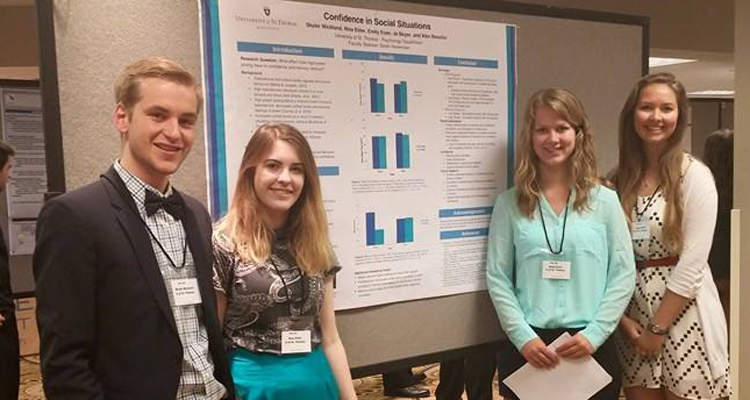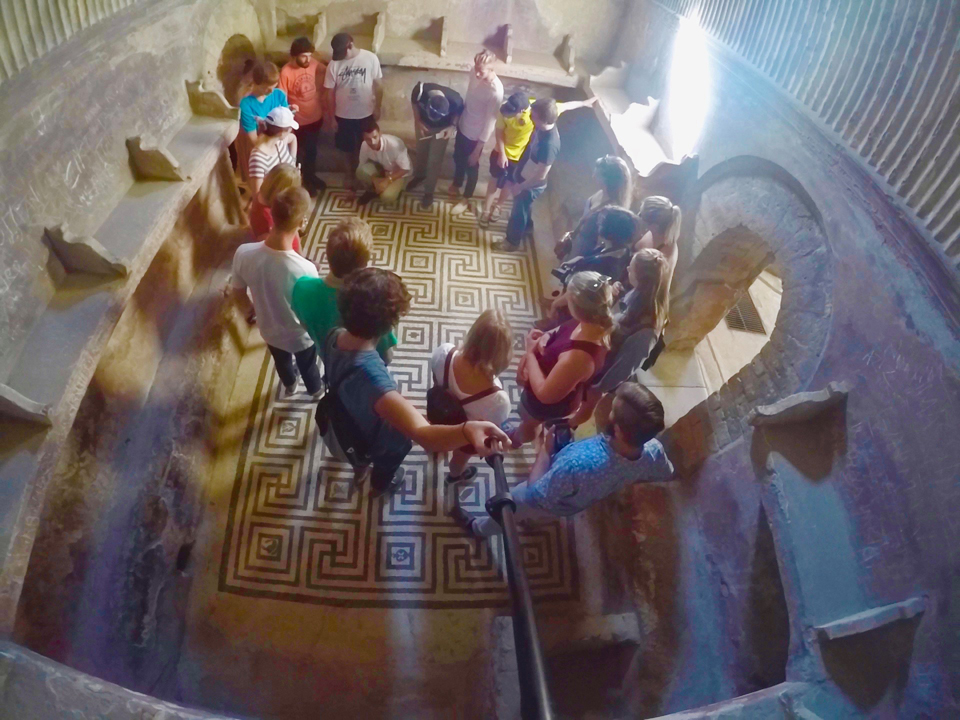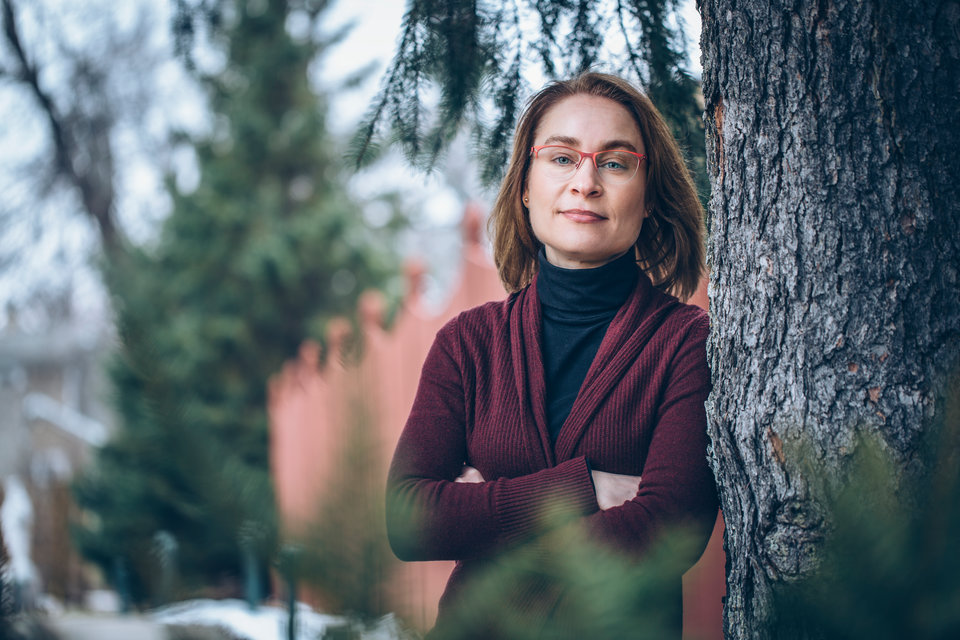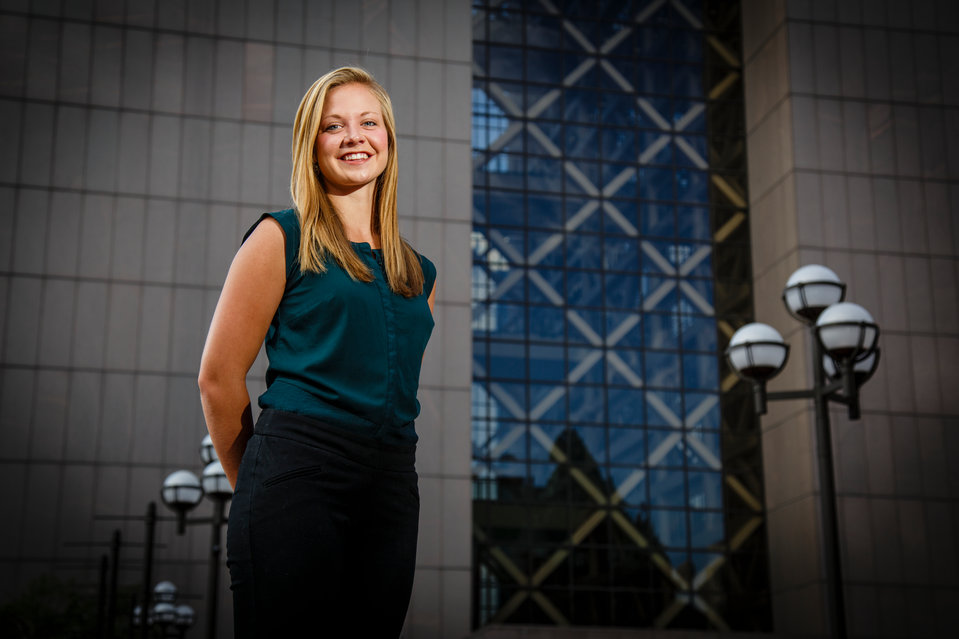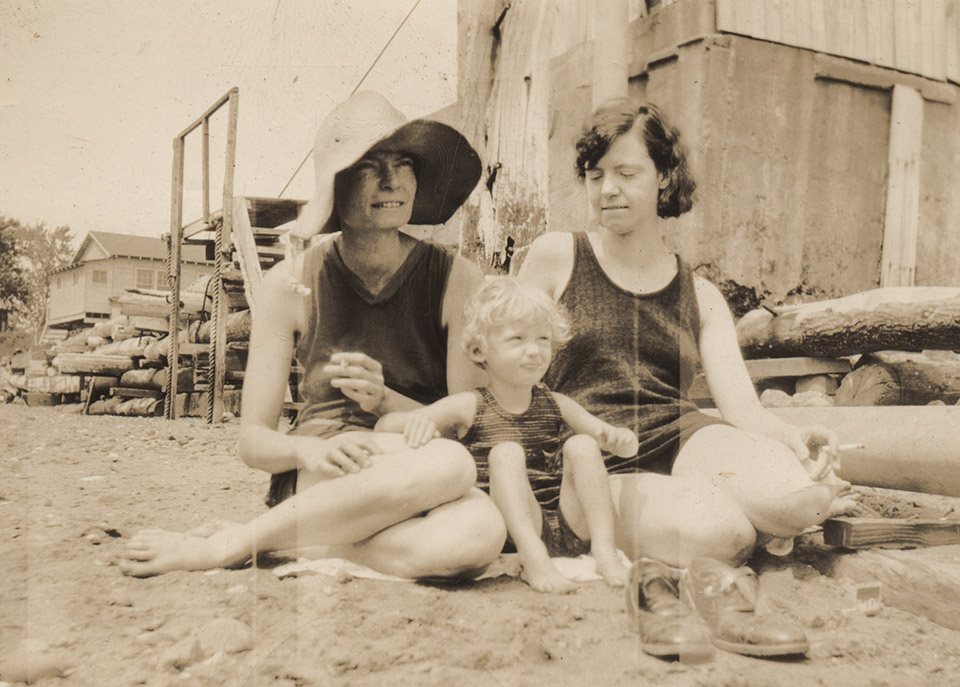Psychology is all about helping people work through their everyday struggles with life’s challenges, right? The clinical dimension of psychology is certainly its most well-known aspect, but as my faculty friends know, “I’m not that kind of psychologist.” In fact, most of us aren’t. First and foremost, psychology is a research discipline that explores mental processes and behavior through systematic empirical investigation. This science of psychology is what our students here at St. Thomas experience and come to master through the psychology curriculum and through hands-on work in constantly active research teams.
The Psychology Department has come a long way from Foley Theater, which featured tiny bench-style electronics rooms posing as faculty offices and no true lab space. When I started in 1990 as the sixth full-time faculty member in the department, having three students present at the local research meeting would have been hailed as a major achievement. Flash forward to 2015: Over 50 students presented 20 research projects at five different professional conferences, from Chicago to London. How did we get from there to here?
Gathering the data
One catalyst was the department’s move from Foley Theater, which once stood where Anderson Athletic and Recreation Complex now stands, to the remodeled Albertus Magnus Hall (now John R. Roach Center for the Liberal Arts) in 1998. Mary Anne Chalkley, emeritus professor of psychology, with the tenacity of a pit bull and the eye of an architect, led the redesign of the department’s space, ensuring that it would be highly functional and sufficient for our needs. All of a sudden we had a relative embarrassment of riches in terms of space to offer research opportunities for our students. Now, of course, we need more.
Another critical factor was the growth of the faculty, not only in number but also in focus. We now have 12 full-time faculty and, in the last 11 years in particular, we have hired six new faculty from graduate programs that place increasingly strong emphasis on research products – presentations and publications. The research momentum of the new faculty is considerably greater than it was even 10 years earlier, and faculty have responded to the higher research standards. This increased engagement with research has developed with the evolving identity of St. Thomas as a teaching university. Starting from the 1990s, the university has placed increasing emphasis and support on faculty work that integrates teaching with professional scholarship involving students.
This approach was a perfect fit for both the curriculum and the research of psychology faculty. Our hands-on approach to teaching always has placed student-faculty collaboration front and center, and our major places a substantial emphasis on research. Psychology majors take three courses that focus specifically on the design, implementation, analysis and presentation of empirical research projects. The first is a fundamentals course laying the groundwork for content-specific research courses in major sub-areas of the field. Students choose two content labs that include direct research experience in biological psychology, cognition/learning, social psychology, psychological testing or developmental psychology.
Some students get a de facto fourth research course in the Psychology Department capstone. Formerly named History and Systems, the course was transformed by faculty member and psychology historian Dr. Ann Johnson, director of faculty development. It is now a thoughtful and intense examination of psychology’s development in the context of social change and social problems, an approach that fits squarely with St. Thomas’ mission. The course was renamed History of Psychology in Social Context and was adopted as our major’s capstone.
When Dr. Jean Giebenhain taught the course, she felt that it needed to have a research component, one that reflected its social justice emphasis. Qualitative research seemed like the way to go. Most research in psychology is quantitative, emphasizing tight internal control, careful procedures, and collection and analysis of behavioral data. Qualitative methods involve analysis of existing data, such as interviews, published works and historical records. In Giebenhain’s version of the history course, students conduct historical, archival studies on psychological topics. They are required to investigate primary sources to collect qualitative data, comparing the scholarly literature on a particular topic, across selected time periods with public perceptions on the same topic as evidenced in the popular press. The data are considered in light of the historical context (e.g., wars, the Depression, the civil rights movement). This approach adds something extremely valuable to the research experience: Students learn about historical, archival research and engage in a different way of thinking about data and data analyses. This way of thinking also serves as a perfect complement to the quantitative approach. Perhaps most important, these historical projects deepen students’ perspectives on their liberal arts education as a whole.
Partially due to her innovative use of research in the psychology capstone course, Giebenhain won the 2015 Undergraduate Research Award for Faculty (in previous years awarded to colleagues Elise Amel and Mary Anne Chalkley). Dr. David Steele, director of St. Thomas’ Grants and Research Office, noted that, “The Department of Psychology has emerged as one of the most active departments on campus when it comes to one-on-one, facultymentored undergraduate research. I believe that the department has an amazing culture that not only supports students conducting cutting-edge research, but also stresses the importance of their participating as junior scholars more broadly in their field.”
Outside of their classes, students have the opportunity to get involved directly in research projects as collaborators with psychology faculty, who maintain active research programs conducted in large part through collaboration with students. These projects range from research on perceptual illusion (Dr. Uta Wolfe) and observations of mountain gorillas at the Como Zoo (Dr. Sarah Hankerson), to surveys of participants about their family relationships (Dr. John Buri), observations of infant-parent interaction (Dr. Allison Jessee) and an analysis of the effects of thinking in the third person on attitudes and biases (Dr. Ryan Bremner). Indeed, departmental research fits well with the St. Thomas mission, as “working skillfully to advance the common good” could be a subtitle for many faculty projects such as these:
• “Seeing the world through green-colored glasses? Openness to experience and organization-wide environmental sustainability efforts” (Dr. Elise Amel and Dr. Britain Scott)
• “Exploring social identity and social support in female musician cancer survivors” (Dr. Jean Giebenhain)
• “Exploring the relationship between moral identity, integrity and civic engagement frequency” (Dr. Tonia Bock)
• “Depression, insomnia and nicotine: overlapping impediments to sleep in a national sample of college students” (Dr. Roxanne Prichard)
The growth of faculty-student collaboration over the past decade has changed the expectations that students and faculty have about what psychology majors should be doing and when. Students are encouraged to seek out research opportunities earlier in their college careers – in fact, at the very start – and students respond energetically. To their credit, our faculty do their best to make sure quality projects are available in developing their research agendas. With a higher number of projects running in faculty labs, increasing responsibility falls to the students to schedule and organize the research, and there seems to be no shortage of students who step up to the challenge. Guiding a research project from inception through presentation requires critical thinking, teamwork, perseverance and even a little bit of guile. The professional skills gained range from compiling and organizing professional literature to formulating a relevant question and translating that question into a testable project design.
“Our majors are getting experience that typically only grad students get. What an incredible opportunity for them,” Dr. John Buri said.
It is indeed a great opportunity and one that gives students continuing on to graduate school a “leg up.”
“The research classes at St. Thomas helped me to become familiar and comfortable working with participants and other students across different disciplines. This alone has put me ahead of my fellow OT students,” said Adrian Jung ’12, who is becoming an occupational therapist.
Tammi Polingo ’13, a Master of Social Work candidate at the University of Chicago, expressed a similar view: “Because of the research classes I took in psychology, … I was able to test out of research classes in my master’s program, allowing me to take more advanced courses than my MSW peers.”
The benefits of conducting research extend to real jobs as well. Former St. Thomas admissions counselor Josh Anderson, a psychology/business grad in 2011 and now enrollment coordinator at Providence Academy, observed that, “The focus on data analysis, research, designing projects … and all the details that go along with those activities has definitely been a big part of my career in enrollment management both at St. Thomas and now at Providence.” Jesse Stone ’15 noted that, in his current role as a job recruiter, he has to ask the right questions to ensure a good fit between applicant and available positions. “This process is very similar to creating questions for a research study – one must be intentional and conscious of how they are asking questions. … Without the research-heavy psych curriculum, …I would not be as prepared,” Stone said.
One of the most important benefits of research experiences is the confidence and command students gain. Giebenhain noted this as her favorite aspect of mentoring research – seeing the reaction as students realize “I can do this!” This feeling was echoed by Angie Kurth ’13, now in the Ph.D. program for developmental psychology at Notre Dame.
“I found myself incredibly well prepared to conduct research at the graduate level,” Kurth said. “Many students in my program took time to gain additional research experience after receiving a bachelor’s degree, and I was comparably prepared having conducted research at St. Thomas.”
Sarah (Nelson) Cronin ’12, now a doctoral student in the University of Minnesota’s Counseling Psychology program, said that her experiences at St. Thomas gave her “a profound sense of self-efficacy.”
The benefits of the research activity in the Psychology Department by no means stop there – collaborative activity energizes the department and makes for a lively and collegial atmosphere shared by students, faculty and staff. Hardly a day goes by without gaggles of students hanging out in the student work rooms, the lab spaces or a faculty member’s office working on the many aspects of their projects. Students get much-need sugar fixes from administrative assistant Julie Jepma’s treat bowl. Jepma is the concertmaster in the whole orchestra, coordinating the players and serving as a go-to resource for information, cheer and candy, and putting out the brush fires that occasionally occur due to the sheer friction of that much research activity.
The sense of community that emerges from collaboration is not lost on students; in fact, it might be one of the most important things about their experience in the department. Monique Dargis ’12 recalled that the department “was a warm and welcoming place for me on campus. Because I lived off campus, it was essentially my second home for three years and I spent countless late nights in the computer pods finishing homework or talking with other students.” Jillian Wright ’12 agreed: “Lower level JRC became a second home to me and a place I felt accepted, welcomed and challenged by classmates who, like me, were striving to savor every moment of their education.” Taylor Larson ’15 summed it up beautifully: “There was no other place on campus where I could walk in and feel like I was home.”
Hitting the road
The increase in research activity and productivity is only half of the story. The last 10 years of faculty-student collaboration have witnessed a dramatic rise in presentations of finished research work in public venues. Historically, the most common outlet for student research from the Psychology Department has been the Minnesota Undergraduate Psychology Conference (affectionately known as “mup-see”), held in April each year at a local college or university. In an important development in engaging our students, Buri and Dr. Greg Robinson-Riegler decided to make attendance and presentation at MUPC mandatory in two of our spring lab courses. This meant that about 50 students were presenting about 15 projects each year at the conference, a number that is growing.
Another venue was discovered by Giebenhain, who wanted a fall semester outlet for student presentations. Like any good researcher, she dug around and found an undergraduate research conference at Viterbo College in Wisconsin. Giebenhain starting taking her entire class to this interdisciplinary conference and the research from her classes regularly wins awards at this venue. She then decided to take it up a notch by having students submit projects to the Midwestern Psychological Association conference in Chicago, held every May. MPA is the largest regional meeting of the American Psychological Association and a more competitive venue for research presentation. In the five years since she first took students to this conference, more of us have followed her lead. The number of students presenting in Chicago has swelled from a dozen in 2011 to over 40 in each of the last two years. Now, the Psychology Department’s annual “family vacation” has become an enduring tradition.
The planning for MPA starts early in the fall semester, as faculty of research classes encourage their students to apply. The application deadline for the conference is in November; students must submit a 400-word abstract describing a project’s motivation and hypothesis (or, if they are far enough along, their actual data). Decisions come in December, and by Christmas, students know whether they’ve been chosen to present. To this point (five years and counting), we’ve never had a project rejected.
Behind-the-scenes coordination starts in January as RobinsonRiegler dons his travel agent cap: hotel reservations (typically 12 rooms for three nights), conference pre-registration for all students, Megabus tickets and countless email check-ins with our student attendees. At an orientation the week before the conference, faculty chaperones discuss the what, when, where and hows of attending a conference, and stress the 75 percent rule: Students must be spending at least three-quarters of their daytime hours attending something at the conference rather than seeing the sights in Chicago. The fact that MUPC and MPA fall on back-to-back weekends makes late spring semester the peak of the research activity, shifting the department’s poster printer into overdrive.
The trip begins with a cat-herding exercise at Union Station in St. Paul, as about 40 sleepy undergrads show up for the early morning bus. Imagine the Megabus driver’s reaction as he approaches, as he realizes a hoard of college students is about to board. The head count proceeds slowly but surely as the students ascend to the upper deck of the bus, while faculty advisers pay an extra dollar to sit in the “expensive seats” on the first level, complete with plastic tables and cup holders. After disembarking hours later from the Megabus at Union Station and trundling a mile to the Palmer House Hilton with suitcases, backpacks, pillows and poster tubes, the faculty and their 40-plus students mount the escalator and enter the Palmer House lobby with audible “oohs” and “aaahs” as they step into the Gatsby-era lobby.
The main venue for undergraduate research projects at MPA is the series of undergraduate poster sessions sponsored by Psi Chi, the national honorary for undergraduate students majoring in psychology. Dr. Regan Gurung, vice-president of Psi Chi and a member of the faculty at the University of Wisconsin-Green Bay (the current organizers of these sessions), noted that having “lots of students creates a lot of energy, sharing and camaraderie.” Gurung has spoken with admiration to our faculty and students, and the fact that we can “pull the trip off” with so many students each year.
Students’ experiences at these conferences are formative, as they go in as nervous and tentative students and emerge confident and competent professionals, connecting with other conference attendees as researchers, professional colleagues and friends. Taylor (Larson) Hazelbaker ’15, now a Ph.D. student at UCLA, remembered that “I went from an anxious sophomore hiding behind my older group members at MUPC to presenting research independently at APS (Association for Psychological Science).” Jo Beyer, a current junior who presented last year as a sophomore, said, “It was both invigorating and terrifying. I was nervous about what questions people might ask … however, I quickly gained the confidence to engage in some really great conversations about my work. … It was just an amazing feeling to be viewed as a scientist.”
Students are truly “lit up” by the interest that people invariably show in their research. Katie Reynoldson ’15, now a Ph.D. student at Old Dominion, said, “You come to realize you are the expert about your research and that others are genuinely interested in things that you are passionate about.” Dr. Ryan Martin ’99, currently faculty at UW-Green Bay, admired St. Thomas’ contributions to the conference. “As a proud alum, I always try and stop by the presentations of St. Thomas psychology students, and I’m always impressed. … They talk about their research well, answer questions well and, in the end, it’s obvious they are contributing to the literature in a meaningful and important way.”
Once the conference winds down, we conduct our traditional “exit interviews” on the Megabus back to the Twin Cities. We ask the students a series of questions about their experiences, including how they felt as professionals, the interactions they had with other conference-goers, their favorite presentations and other highlights. A deeper set of written reflections is required from each student upon our return.
Student travel for research and presentation is certainly not limited to the region. Psychology students have accompanied research mentors to national and international meetings, including the American Psychological Association, the Association for Psychological Science, the Society for Research in Child Development, the Society for Industrial and Organizational Psychology, the Association for Moral Education and many others, in locations ranging from Seattle and Vancouver to Boston, overseas to the United Kingdom and Australia, and to other destinations in between. Travel to conferences, even on the Megabus, is expensive and wouldn’t be possible without substantial support from the CAS Dean’s Office and the Office of Undergraduate Research and Collaborative Scholarship. In addition, the CAS Dean’s Office found funding for a poster printer, support for hosting the 2013 Minnesota Undergraduate Psychology Conference and special grants to support students traveling to international venues.
The dividends from this investment in student-faculty research are substantial, judging from the alumni looking back on their experiences. Alexandra Johnson ’10, a Ph.D. student at the University of Alabama, noted, “Being able to find, critically evaluate and integrate information has been a very valuable skill not just in graduate school, but for problem-solving in life more generally.” The value of these skills also was captured nicely by Amy Gunty ’07, mental health practitioner, who said, “In my work today as a mental health practitioner in a program for kids with autism, I am constantly asking myself, ‘Is what we are doing working?’ and searching for data upon which I can base an answer to that question. I truly believe the student-faculty research program at St. Thomas has made me a better researcher, a better student and a better clinician.”
The entire department would agree that working collaboratively with students is probably what gets us up in the morning, and to see its transformative effect on students is truly inspiring.
“We have wonderful students here doing incredible things,” Giebenhain said in remarks to faculty about the joys of mentoring. “Tommies can and do change the world. Research can change the world, and I am proud to be part of an institution that recognizes that getting students involved and excited about the research process will promote significant discoveries and move our world in positive directions. Faculty: Go forth and mentor. Students: Seize opportunity!”
Read more from CAS Spotlight.
